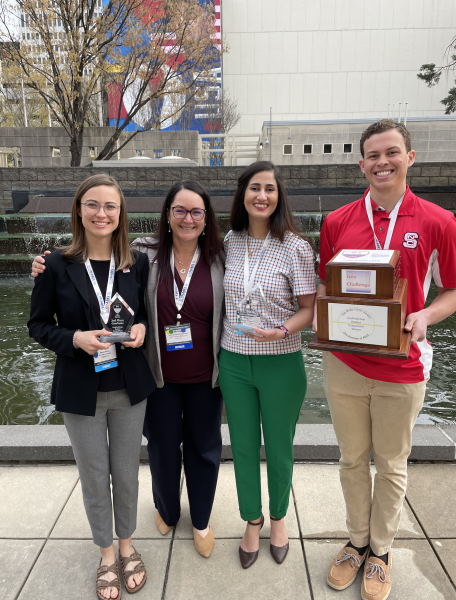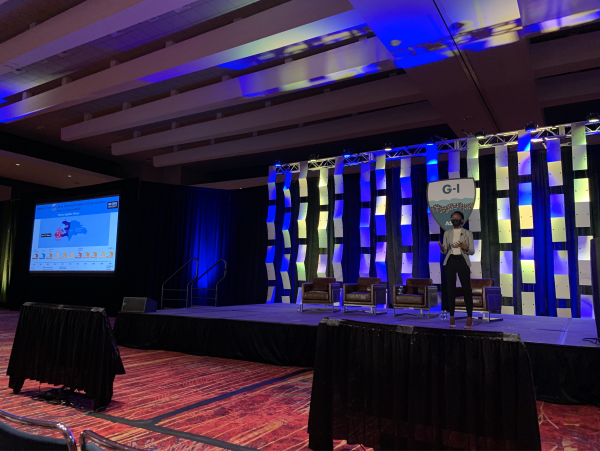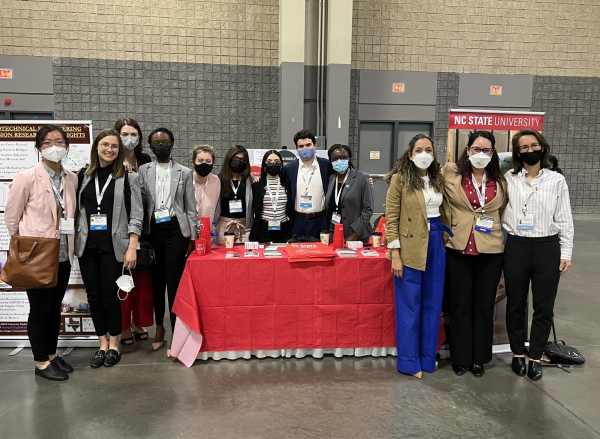Sixteen CCEE students attended Geo-Congress 2022 on March 20-23 in Charlotte, North Carolina, giving talks, presenting posters, and participating in a career fair and a networking event at the NASCAR Hall of Fame. It was the largest group of CCEE students to ever attend the annual conference.

The students also participated in Geo-Challenges: student competitions organized by the Geo-Institute of the American Society of Civil Engineers. CCEE students won three Geo-Challenge awards:
- Ph.D. student Pegah Ghasemi and undergraduate student Jacob Harris won first place in the Geo-Prediction competition, where students predict the behavior of the ground or geotechnical structure in-situ.
- Ph.D. student Marlee Strong won third place in the Geo-Poster competition, where students share their research outcomes through poster presentations.
- Ghasemi and Strong won second place in the Geo-Video competition, where students produce a short video on any topic related to geotechnical education and practice.
Harris explained the Geo-Prediction competition was based on a real-world example problem that required the team to determine the lateral deformation and settlement of points under loads of a provided embankment.
“To solve this problem, we had to make assumptions about the soil profile and the equations we needed to use to solve the problem,” Harris said. “Once our prediction was submitted, four finalists were chosen to present their results at Geo-Congress. It took countless hours of researching and implementing equations that we thought may work for the problem. It also took about a week of practicing and working on the presentation to get ready to present at the conference. It felt great to win because of all the hard work we put into the prediction and the long hours we put into preparing the presentation.”
Strong said the Geo-Video competition was a unique opportunity for students to creatively explain a fundamental geotechnical engineering concept.
“My partner Pegah and I are both performing research focused on bio-cemented soil,” Strong said. “We were both very excited to use the Geo-Video competition to create an educational short film about our research in a way that someone outside our area of expertise could easily digest.”

Another highlight of the event was a Geo-Pit lecture from Ph.D. student Nancy Ingabire Abayo. She described her work with CCEE assistant professor Dr. Ashly Cabas and Dr. Chunyang Ji and Cristina Lorenzo-Velazquez as part of the National Science Foundation Geotechnical Extreme Events Reconnaissance (GEER) team, conducting virtual reconnaissance after the 2021 Haiti Earthquake.
Abayo said she felt “honored and privileged” to give a Geo-Pit Talk at the conference.
“I felt nervous, but also grateful and humbled to present alongside very amazing Geotech Giants and Rising Stars in the field,” she said. “It was an important topic because of the nature of the event and that the country was still experiencing multiple other hazards before and after.”
Abayo said that performing the earthquake reconnaissance virtually was a unique but rewarding experience.
“It allowed for collaboration with social scientists, and provided an opportunity for Haitian students, faculty and scientists to be involved in the reconnaissance effort. It was particularly important for me because I was able to share several lessons that I learned while participating as a graduate student. Some of the key lessons were the importance of community engagement and making science accessible to the general public, the importance of interdisciplinary and international collaboration, and the necessity to have a holistic understanding of the communities affected by natural disasters, especially those who are dealing with multiple disasters. One of the most important reminders highlighted from this experience for me was to keep people a priority in all that I do both in my curricular or in extracurricular engagements.”
CCEE associate professor Dr. Brina Montoya, who compared Geo-Pit lectures to TED Talks, said it is rare for a student to be asked to give a lecture at the conference.
“Nancy did a phenomenal job,” Montoya said. “She made sure the struggles of the people of Haiti were known and brought to light. We are civil engineers for people, and we need to put people first. So many people who know her work were saying how inspirational her lecture was, and it was a good reminder of why we work in geoengineering.”

The CCEE students also hosted an academic showcase booth as part of the conference.
“It’s a great way to showcase our department to potential students and employers,” Montoya said. “People were really interested in our Engineering Online offerings and ongoing research.”
Strong said there is no comparison between attending an in-person conference versus a virtual event.
“One day at Geo-Congress, I coincidentally crossed paths with an expert in Discrete Element Modeling (DEM),” she said. “The in-person conference allowed me to introduce myself to him and also discuss current research problems I am working on using DEM. If the conference would have been virtual, it would have been very unlikely that I would have had the opportunity to do this.”

